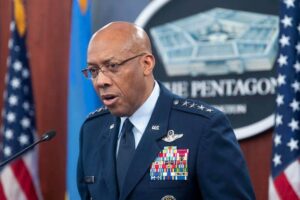Troy Meink Nominated as New Air Force Secretary by President-elect Trump
The selection of a new leader for the United States Air Force marks a significant step in shaping the future of national defense. President-elect Donald J. Trump has announced his choice of Troy Meink, a seasoned expert in aerospace and intelligence roles, as the next secretary of the Air Force. This decision concludes the lineup of service secretary nominees under Trump’s administration.
Announcing the nomination via social media, Trump expressed confidence in Meink’s capabilities: “I am pleased to announce that Dr. Troy Meink will be the next United States secretary of the Air Force,” he stated, emphasizing Meink’s role in working alongside Pete Hegseth, the nominee for secretary of defense, to maintain a powerful and effective Air Force.
Meink’s career began in 1988 when he entered the Air Force through the Reserve Officers’ Training Corps at South Dakota State University. His experience spans various critical roles, including serving as a navigator and instructor for the KC-135 Stratotanker and acting as a lead test engineer for the Missile Defense Agency. He also held the position of deputy under secretary of the Air Force for space under President Barack Obama and was the director of signals intelligence systems acquisition at the National Reconnaissance Office.
Throughout his career, Meink completed 100 sorties, which included eight combat missions and 29 combat support missions during Operations Desert Shield, Desert Storm, and Provide Comfort. His extensive background highlights his suitability for the role, especially in light of Trump’s focus on space as a key component of national defense policy.
“Clearly, there is focus on space,” noted retired Lt. Gen. Dave Deptula, the dean of the Mitchell Institute for Aerospace Studies, underscoring the strategic emphasis that Trump’s choice reflects.
If confirmed, Meink will succeed Air Force Secretary Frank Kendall, who recently delivered a farewell speech urging for a more robust Space Force to counter threats from nations like China and Russia. Kendall’s report, “The Department of the Air Force in 2050,” argues that “space will be recognized as the decisive domain for almost all military operations.”
Todd Harrison, a senior fellow at the American Enterprise Institute specializing in space policy, remarked that Meink would be the “first space-focused” Air Force secretary due to his extensive experience across various sectors of defense and intelligence. “I think he is going to have a major bureaucratic advantage over the other service secretaries that have been nominated,” Harrison stated, expressing confidence in Meink’s smooth path to confirmation.
Additionally, Aviation Week reported that Matt Lohmeier, a former Space Force lieutenant colonel, is Trump’s pick for the Air Force’s under secretary. Although not confirmed by Trump yet, Lohmeier’s background includes a controversial dismissal from Buckley Space Force Base in Colorado over remarks in a podcast about his book.
As the defense community anticipates these appointments, the focus remains on how these leaders will navigate the evolving priorities of the Air Force and Space Force in the coming years.










